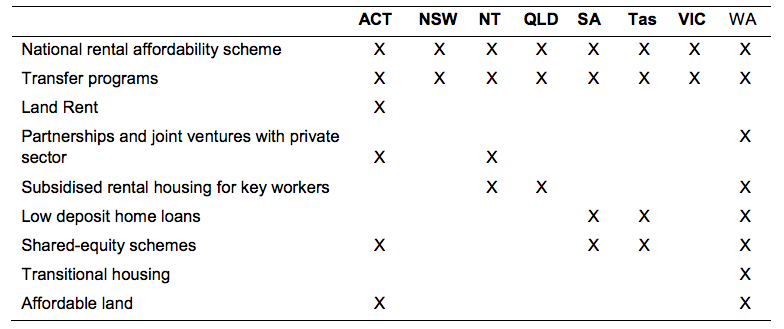
Resilience and leadership: keys to delivering affordable housing
AHURI report evaluates state-led housing strategies
18 Oct 2017
To effectively deliver affordable housing, Governments need to develop housing strategies that are resilient to, and adapt with, evolving political circumstances, create opportunities in times of economic change and that inspire strong leadership, new research finds.
The report, ‘Government led innovations in affordable housing delivery’, undertaken for AHURI by researchers from Curtin University and The University of Sydney, explores what makes a robust affordable housing strategy or program, highlighting the lessons that can be learnt from state governments that have successfully delivered affordable housing.
...to succeed, a strategy or program must be resilient, in that it must be able to survive a change of government...
It looked at four cases studies: housing strategies in both WA and ACT and at state-level programs in WA and NSW.
Both the WA and ACT housing strategies were broad in scope, accounting for the entire continuum of housing from social housing for low-income households through to supporting affordable purchase options in the private market, such as shared equity.
In particular, the WA Affordable housing strategy shows that strong leadership created the conditions for innovation and that quality communication within and outside the organisation, a range of complimentary skillsets and broad industry consultation led to the strategy’s success in delivering its target of 20,000 dwellings five years early. ‘Governments can take the lead but the actual delivery requires the cooperation of key private and non-government sectors. An organisation’s ability to recognise how and when to engage with the private sector is critical.’
Table 1: Established state-level affordable housing delivery schemes

Source: Rowley, S., James, A., Phibbs, P., Nouwelant, R. and Troy, L. (2017) Government led innovations in affordable housing delivery, AHURI Final Report No. 289
The research found that to succeed a strategy or program must be resilient, in that it must be able to survive a change of government and be able to maintain its initial momentum through continual reinforcement of key messages and regular communication of achievements. Strategies are most effective when they are run with the flexibility to respond quickly to opportunities arising from housing market conditions and unexpected funding sources, such as by having a ‘shovel-ready’ housing strategy.
...reliance on political champions is also a challenge when implementing long-term strategies,...changes of government at the federal and state levels, can lead to significant delays and changes that threaten the successful implementation of programs.
The research also found that having political champions who are effective leaders is a key component of a successful strategy or program. However, reliance on political champions is also a challenge when implementing long-term strategies, as changes in government direction and personnel, and actual changes of government at the federal and state levels, can lead to significant delays and changes that threaten the successful implementation of programs. In addition, programs where there was no bureaucratic consensus on direction and purpose were most at risk of stopping or being curtailed.
‘We found that both the WA and ACT strategies had a key role for the private and non-government sectors in implementing the affordable housing strategies and delivering ambitious dwelling targets with little direct government support,’ says Professor Steven Rowley from Curtin University, lead author of the research. ‘Governments can take the lead but the actual delivery requires the cooperation of key private and non-government sectors. An organisation’s ability to recognise how and when to engage with the private sector is critical.’
The research report is available to download from the AHURI website.
